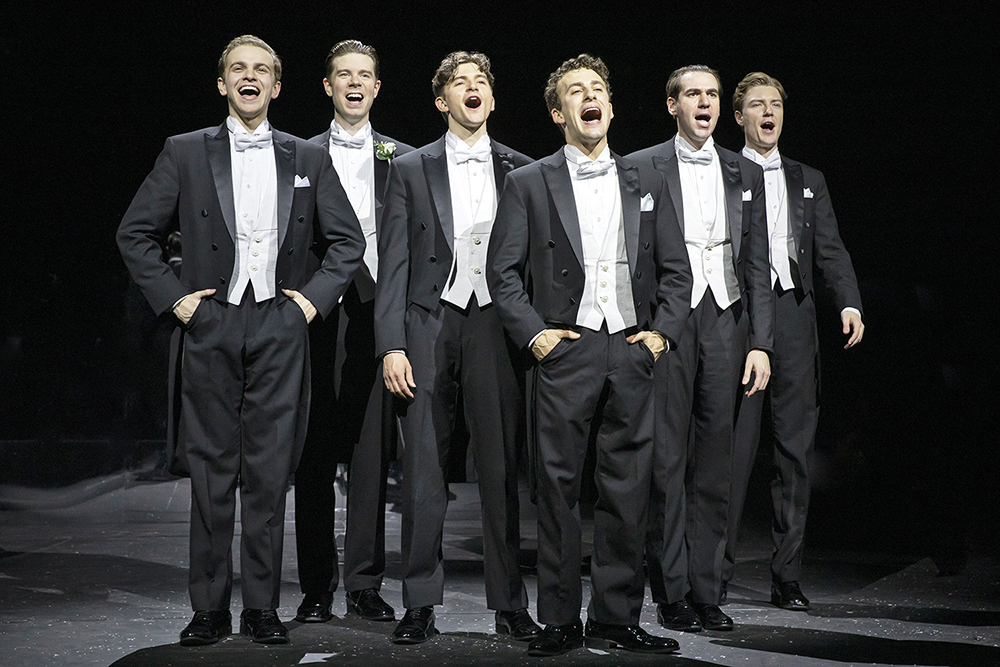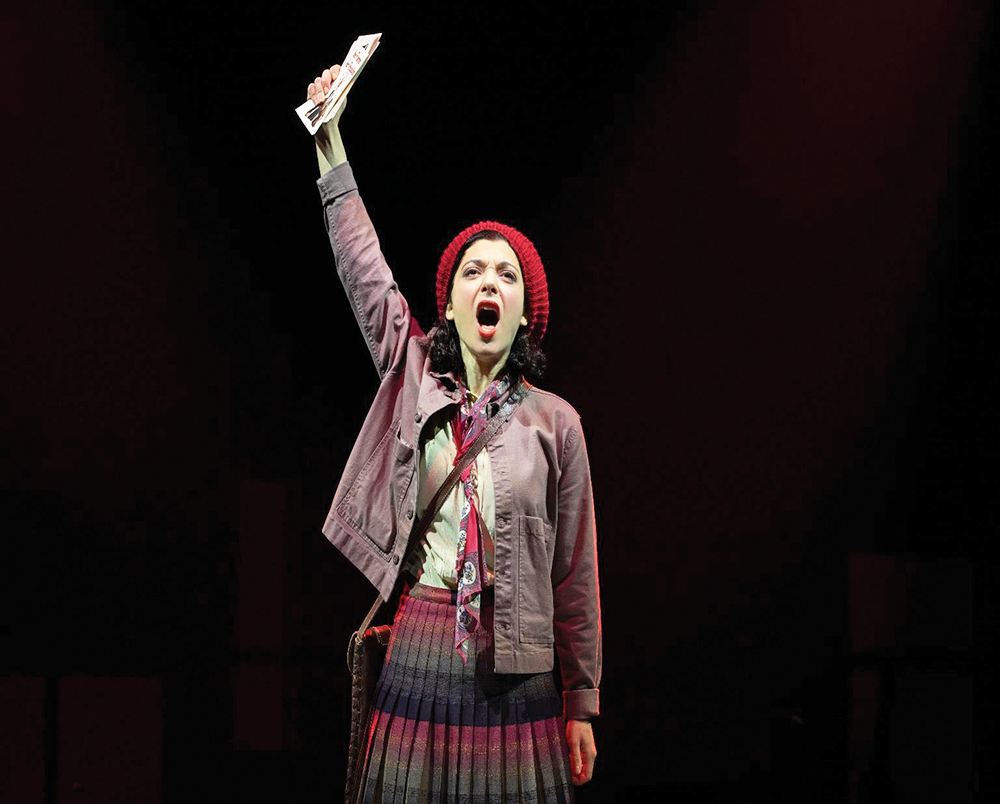
(Credit: Julieta Cervantes)
February 4: The Barrymore Theater’s 1058 seats are filled for the closing performance of Harmony. I weave through half a block of two parallel ticket holder lines and hope for an affordable return ticket. Showtime: Four minutes and counting. I pivot, and a woman brandishes an e-ticket. “You’re selling?” YES. I pay her and join the stragglers entering the Barrymore.
Relevance? Well, if this is what last minute ticket frenzy and street-side crowd control look like, then once inside, crowd control is nonexistent. In my decades of theatergoing, I’ve never experienced an audience going wild from the curtain rising to the umpteenth encore–hooting, clapping, standing, and cheering for solos, ensemble numbers, and even quotations. Kudos to Barry Manilow, Bruce Sussman, director/choreographer Warren Carlyle and the entire creative team on an unforgettable production. Yet the audience’s enthusiasm was just as much about the show’s salient messages as about Harmony’s superb artistry. So why, when it was slated to run through at least July 2024, did it close?

As Paulson (2024, Jan. 16) noted, ticket sales reached only 77% of theater capacity. Broadway operating costs are staggering, so pragmatism was a decisive factor. It’s likely why the producers selected the Museum of the Jewish Heritage/National Yiddish Theater-Folksbiene for the show’s initial 2022 New York production, but did Harmony’s themes also affect sales?
Harmony is a parable. Since 1997, Manilow said, “Every time we put this up, there’s always been an antisemitic problem” (https://www.youtube.com/watch?v=7fDegi34aRw). The musical follows three Jews and three Gentiles, who from 1927-1933 were acclaimed Berlin-based entertainers. Last month, Sussman, Harmony’s librettist and lyricist, explained why this saga speaks to us today. “These six extraordinary young men …witnessed their beloved country slip from democracy, to autocracy, and dictatorship, and then became victims of it” (https://www.youtube.com/watch?v=kQya7mhS6Hc).
In the face of the progressively suffocating evil that overtook Germany, both the Jewish Harmonists, and their non-Jewish group members, see their lives, livelihoods, and eventually freedoms unravel—but let’s start, as the play does, at their zenith. Harmony begins with the Comedian Harmonists’ triumphant December 1933 performance at Carnegie Hall, as the elderly Josef Roman Cycowski,“Rabbi” (Chip Zien) recalls it.

Rabbi narrates how his younger “Rabbi” self (Danny Kornfeld), “Erich” Erich Abraham Collin (Eric Peters), “Harry” Harry Frommerman (Zal Owen), Bulgarian “Lesh”-Asparuch [Ari] Leschnikoff- (Steven Telsey), “Chopin” Erwin Bootz (Blake Roman), and “Bobby” Robert Biberti (Sean Bell) perform in cabarets, concert acts, and eventually films.
The Comedian Harmonists meet illustrious figures–Richard Strauss, Marlene Dietrich, Josephine Baker, and Albert Einstein. Just before the end of Act I, Einstein, a recent refugee, visits them in their Carnegie Hall dressing room. Einstein says, “The world will not be destroyed by those who do evil, but by those who watch them and do nothing.” (Note: The audience exploded in cheers at this.)
After Carnegie Hall, the clock winds backwards to the Harmonists’ tenuous start in 1927, when composer Harry, through a series of ads, recruits a motley sextet of harmonists, including a student cantor from Poland (Rabbi), a medical student who can’t stand blood (Erich), and a Bulgarian waiter (Lesh). Together with Bobby and Chopin, the sextet performs at Club Cinderella, a cheap cabaret, where, in 1929, they encounter starlet Dietrich. The Harmonists gradually advance to the classier Barbarina club.
Some Harmonists face complex issues. At times, humor and song defuse tension. When Erich struggles to tell his assimilated, wealthy parents, who know Strauss and Einstein, that he prefers singing to medicine, Bobby and Lesh role play as his parents; the other Harmonists support him. Then there are romances. In a rare twist, where looming fascism and later, Nuremberg laws spur many Christian wives to divorce their Jewish husbands, Rabbi’s Gentile girlfriend Mary converts, marries him, and deals with being Jewish in fascist Germany. “Chopin” marries Ruth, a Jewish Bolshevik. A chuppah-centered double wedding ensues, but the sound of broken goblets is masked by broken window glass, shattered by Nazi thugs.
The Harmonists, whose popularity skyrockets, embark on a world tour. Ruth organizes rallies in Berlin, while Mary follows her husband to America. In New York, they play the Ziegfeld Follies with Baker, and we revisit their Carnegie Hall triumph. With Hitler now Chancellor, the group’s expatriate dilemma is agonizing. Should they return to a Germany gone mad?

They do return, but to a film venture that is aborted. The same Nazi standartenfuhrer who praised their cabaret act promptly shuts down its production and labels all Jewish-themed, Jewish created, and Jewish performed culture as “degenerate.” It’s a reversal of his previous exploitation of their successes for Reich propaganda purposes. The three Jewish Harmonists (Collin finally admits he is a Jew [he had been baptized]) realize that they must escape Germany. Given the risks, Rabbi urges Mary to reconsider leaving. She responds with Sefer Ruth “Where you go, I will go….” Chopin’s Ruth, a marked woman, flees, and is arrested. But for one brief message, no one hears from her again.
When the Rabbi relives his anguish over not killing Hitler when the chance arose (Yes, the Harmonists were once on the same train with him, really), he repeatedly cries out “Shema Yisrael…” in a pleading song, Threnody. It’s an emotional crescendo that showcases Zien as a consummate performer.
Ruth is a composite character, but the libretto remains mostly faithful to the group’s history. Rabbi and Mary reach the U.S. and remain married for over 60 years, Lesh goes back to Bulgaria, which, he brags, didn’t hand the Nazis even one Jew (it’s true), and the non-Jewish Harmonists acquire new singers but never the same fame.
Harmony’s vibrant lyrical songs, dazzling choreography, documentary projections, poignant solos, have all the makings of a hit musical. But the subtext—read main text–looms large. The beginnings of public ostracism and intimidation of artists, performers, intellectuals, and other dissenting voices emerge early in the play–Jews, those who sympathize with the Jews, patrons of Jewish art, student activists, and others. In Harmony, anything that smacks of Jewish origins is labeled degenerate, immoral, outlawed, and then destroyed.
Nazi “cancel culture” prevails, implemented on individual and collective bases, with frightening consequences. Although it’s clear how Jews and other dissenting voices fared after Hitler became German Chancellor and “Fuhrer,” Harmony is a microcosm of how rapidly things deteriorated, with some parallels for Jews today. Just consider Bret Stephens’ (Autumn 2022) remarks about Jews and cancel culture: “Nations that forget how to think critically—that develop intellectual climates dominated by groupthink, censoriousness, self-silencing, and the broad acceptance of politically correct lies- inevitably fail to evolve constructively. This is obviously bad news for Americans. It should be beyond obvious why it is bad news for Jews, the world’s most canceled people.”
Harmony, as brilliantly executed and entertaining as it is, was perfectly timed, and we have much to learn from it.
Rachel Kovacs, PhD, who teaches communication at CUNY and Judaics locally, is also a PR professional, freelance writer, and theater reviewer for offoffonline.com. She trained in performance at Brandeis and Manchester Universities, Sharon Playhouse, and the American Academy of Dramatic Arts. She can be reached at [email protected].









